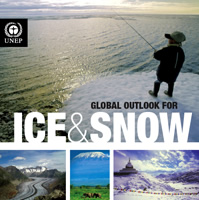| Berichte
über den Klimawandel - Globale Berichte |
 |
UNEP Report 2007 Climate Change |
 |
Ice and Snow |
 |
Klimawandel Informationen |
|
| UNEP
Report 2007: «Global Outlook for Ice and Snow» |
 |
|
UNEP
Executive Director on World Environment Day 2007
|
June
2007
| Lives
and Livelihoods of Hundreds of Millions if not Billions in Many Parts of
the World Influenced by Ice and Snow Losses Linked to Climate Change |
 |
 |
 |
| Message
by Achim Steiner, UNEP Executive Director |
 |
World
Environment Day 2007 focuses on the challenges facing the people and ecosystems
of the Arctic and Antarctic as a result of rapid environmental and climatic
change. In doing so it also links to the wider world where glaciers are
shrinking and an increasing number of extreme weather events are triggering
more frequent droughts and floods.
In
focusing on the polar regions we hold up a mirror to the accelerating impacts
sweeping the whole planet from the release of greenhouse gases into the
atmosphere. These seemingly remote regions vividly illustrate the interconnectedness
of all life on Earth-bringing home to the six billion people alive today
how mutually reliant and linked we all are to landscapes and ecosystems
both near and far.
The
Arctic and Antarctica may be the Earth's climate early warning system-feeling
the heat first-but we know it does not end there. Ocean circulation, the
key driver of regional and global weather systems, is inextricably linked
with melting and freezing processes in and around the poles.
The polar
regions are also a kind of protective shield, reflecting heat back into
space that would otherwise be absorbed on Earth. There is also growing
concern over so-called 'positive feedbacks' including the potential release
of massive amounts of the powerful greenhouse gas methane, which is stored
in the Arctic permafrost. |
 |
So,
what happens in the Arctic and the Antarctic as a result of climate change
is of direct interest to us all-from someone living in the Congo River
Basin, the Australian outback and in rural China, to suburban dwellers
in Berlin, New Delhi, Rio de Janeiro or Washington DC.
At
the same time, the actions of those living outside the polar regions is
of direct interest to Arctic peoples. The vast majority of emissions that
are contributing to melting ice are being generated on the roads and in
the factories, homes and offices of the industrialized and, increasingly,
the rapidly industrializing economies.
We
are currently locked into a vicious and ever widening circle. Our common
responsibility is to make it a virtuous one-to underline that overcoming
the profligate burning of fossil fuels is not a burden but an opportunity.
Switching to a cleaner and more efficient development path can not only
liberate us from the overarching threat of climate change, it can free
us from dependency on a finite and, some might say, politically disruptive
resource.
There
are signs that this switch can-and is indeed starting to-occur as result
of several central factors finally coming into play. Firstly the economics
of inaction and the economic benefits of action have in recent months moved
to the fore. A review by Sir Nicholas Stern, published in advance of the
climate convention talks held in Nairobi in late 2006, has changed the
landscape forever in this respect. It states that if no action is taken,
we risk raising average global temperatures by more than 5 degrees Centigrade
from pre-industrial levels, and this would lead to the equivalent of a
minimum loss of 5 per cent of GDP annually.
In
contrast, the costs of acting to reduce greenhouse gas emissions to avoid
the worst impacts could cost as little as 1 per cent of global GDP each
year. The US firm PricewaterhouseCoopers recently concluded that the world
would have to sacrifice just one year's economic growth over the next four
decades to reduce carbon emissions sufficiently to curb global warming.
The
Stern Review also estimates that reducing emissions would actually make
the world better off. One estimate indicates that, over time, a shift to
a low carbon global economy would trigger benefits of $2.5 trillion a year.
Findings like this take climate change beyond the portfolio of the environment
minister and firmly into the in-tray of the world's finance ministers and
heads of state.
The
second factor is the issue of energy security-or, one might say, energy
insecurity-due to the global dependence on fossil fuels. Countries are
increasingly recognizing that the benefits of renewable energy sources,
low- or zero-emission coal-fired power stations and energy efficiency extend
beyond the atmosphere to national security.
Others
are also starting to grasp another notion of security, which includes the
link between extreme weather events like floods and droughts to wider national
and regional issues.
Climate
change is magnifying existing disparities between rich and poor and aggravating
tensions over fragile or increasingly scarce natural resources such as
productive land and freshwater. It increases the potential to create a
new class of displaced people known collectively as environmental refugees.
top
You
do not have to take my word for that. Cristina Narbona, the Spanish environment
minister, was asked at the recent climate change talks why her country
was investing in a new partnership between UNEP and the UN Development
Programme (UNDP) to assist Africa adapt to climate change. Her response
was clear. Spain links the increasing numbers of people from Africa who
are risking life and limb in flimsy boats to sail to the Canary Islands
with climate change impacts.
Finally,
the science of climate change is now indisputable, and has been further
underlined in the latest reports of the Intergovernmental Panel on Climate
Change released in February this year. The findings put a full stop behind
the scientific debate as to whether humankind is influencing the climate
and now beg the question of what we are going to do about it.
Collective
and decisive political will is the final-and still missing-piece in the
jigsaw puzzle. While many sectors of society are moving to address climate
change-including local authorities, industry, the financial sector and
civil society-the collective political process is moving frustratingly
slowly.
At
the climate change meeting in Nairobi some steps were taken. UNEP and UNDP's
just-mentioned new partnership aims to assist developing countries to secure
a share of the clean energy projects that are starting to flow from the
Kyoto Protocol's Clean Development Mechanism. It will also offer a rapid
response so countries in sub-Saharan Africa and elsewhere can insulate
their economies against climate changes that are already underway.
Furthermore,
the Kyoto Protocol's Adaptation Fund was agreed, and there were other positive
signs, not least on issues like avoided deforestation where there was productive
and fulsome debate. However, no agreement was achieved on the deep and
sustained cuts in greenhouse gas emissions needed to stabilize the atmosphere,
an agreement which is also vital for maintaining confidence and investment
in the blossoming carbon markets. If Nairobi was not the place, then where
and when will this action on deeper cuts in a post-2012 world emerge?
It
was John Tyndall, the English physicist, who first recognized the power
of carbon dioxide and water vapour to change the Earth's climate. That
was over 100 years ago in his seminal paper of 1863. We cannot wait another
100 years to act. Indeed there are some respected observers who claim we
have as little as a decade or so to do so. Six months from now, on the
Indonesian island of Bali, governments will resume the climate talks. I
sincerely hope that Bali will be the watershed where science, security
issues and economics combine to produce wide-ranging political action.
The
theme for this year's World Environment Day is Melting Ice: A Hot Topic -
Thus it is fitting that the main celebrations are being hosted by Norway
on the edge of the Arctic Circle. The logo underlines the global theme
by asking a polar bear, an African farmer, a Pacific islander, an insurer
and businessman, two indigenous children and ultimately 'Yourself' the
rhetorical question of whether indeed this is the topic of our time.
Perhaps
we should have added a further person-namely a politician. World Environment
Day has at its heart the empowerment of the individual citizen. UNEP urges
everyone to embrace this year's theme and put the question to their political
leaders and democratically elected representatives: just how much hotter
does this topic need to become before governments across the globe finally
act?
top
| UNEP
Report 2007: «Global Outlook for Ice and Snow» |
 |
| UNEP-Report
2007 |
UNEP |
 |
 |
| RAOnline Download |
 |
 |
Externe Links |
 World
Meteorological organisation WMO World
Meteorological organisation WMO
 United
Nations Environment Programme UNEP United
Nations Environment Programme UNEP |
|
|
 |
 |
| Source:
UNEP , June 2007 |
top
| Links |
 |
 |
 |
Externe Links |
 |
UN
Environment Programme (UNEP)
UNEP |
|






